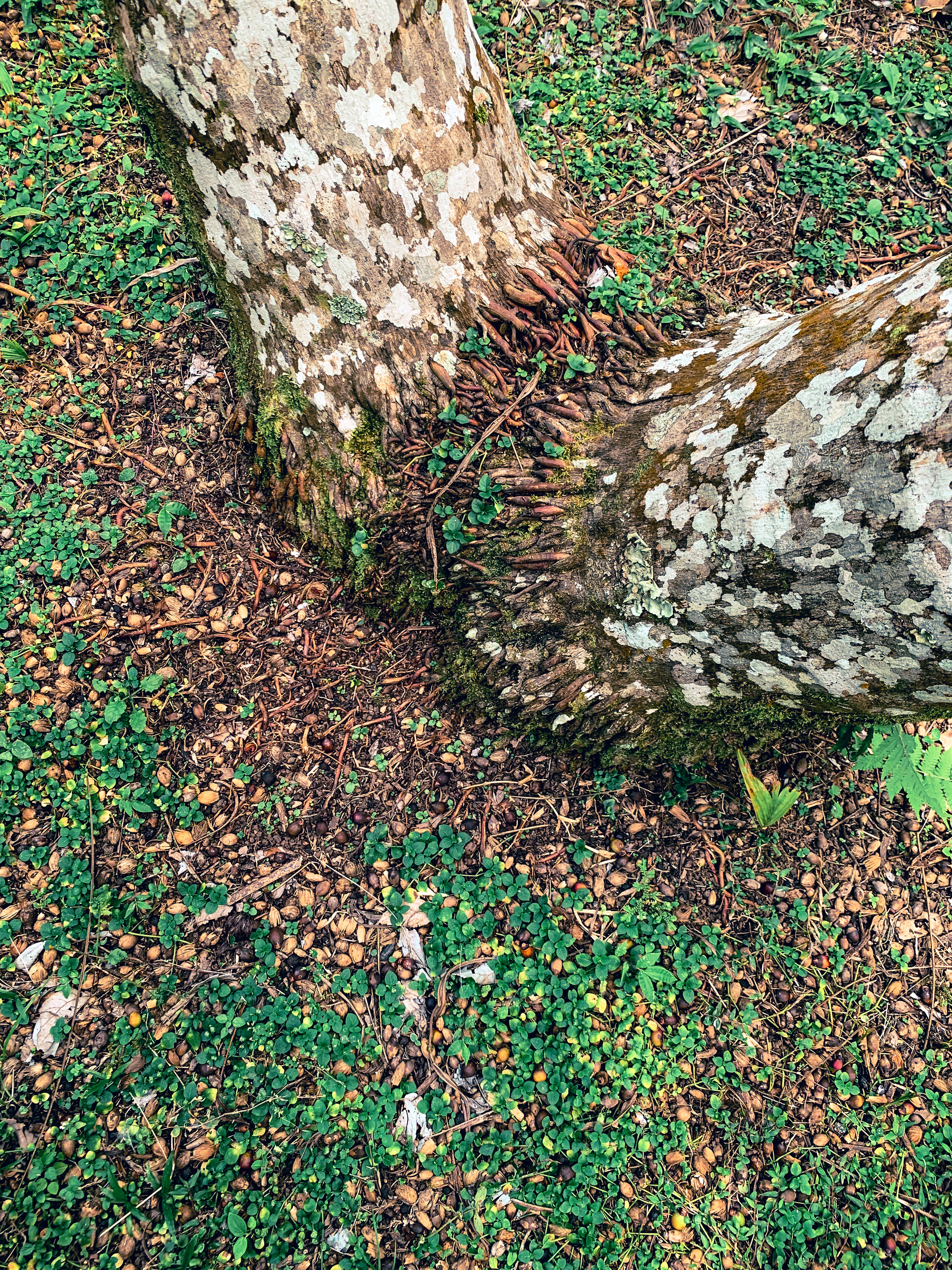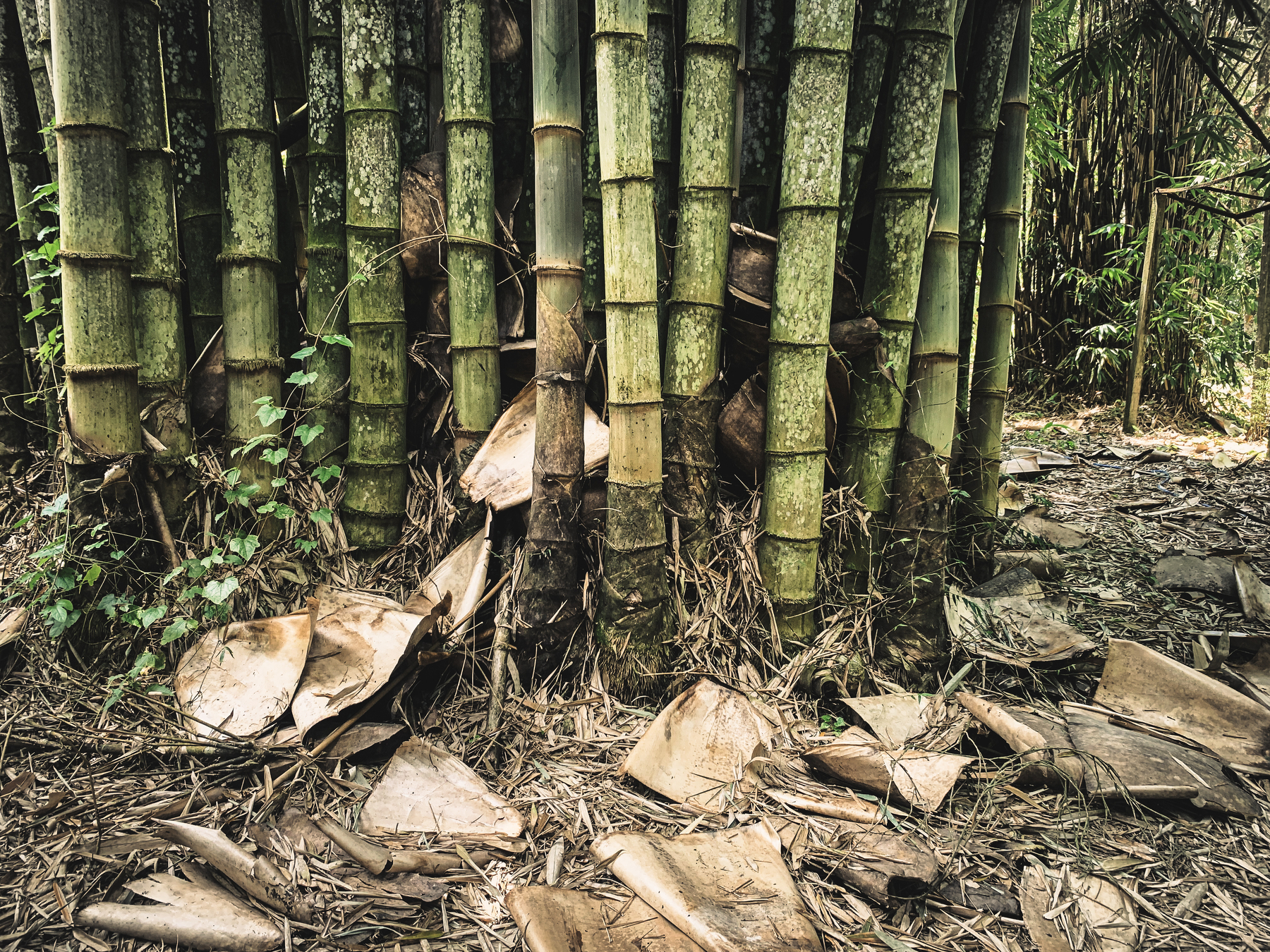this be a verse
to razors and gashes
and stabbings and worse
no harm is intended
and it’s for the best
//
🕊️
//
& pace Larkin
triptych of the dog
//
a cicak dropped a souvenir on me
yesterday, savasana; it was
all happening, pure rejeki, a speck
for playing dead; the simmering night, the sawah
was fizzing and burping boggy chemistry
the gamelan deliberated depth
of banjar space, a soup of bronze and spittle
//
up i, cocks crowing death to rest, dark mind
the cat was sick again, shit cleaned, cats fed
the breath of rain, half-there, in vomit stepped
scrubbed vinegar again, who made the bed
i squinted past the dawn to wash a dish
the load of towels, it was not a test
the shape of chasing weather for a bone
//
and would the three of them have made a city—
Lysias, Lysias, Lysias; he wasn’t there
he wasn’t here, until bumbu for our sambal
did rain down from the sky, and i said Lord
i still deny that you’re an onion seller
how practice held like density, as though
svanasana could house the dog itself
//
🌒
//
see also Rabia Basri
Socrates: (cont.) that while i love (phile-o) you completely, if Lysias too is present, it hasn’t seemed completely right (doke-o) to supply myself for you to practice on (emmeleta-o).
// 228ε
ὡς ἐγώ σε πάνυ μὲν φιλῶ, παρόντος δὲ καὶ Λυσίου, ἐμαυτόν σοι ἐμμελετᾶν παρέχειν οὐ πάνυ δέδοκται
//
the horse’s mouth
teloscopically, my dear, are we botany
born reading leaves, the pricking fear of bees
are talking, my lisp, or rearing wobbly nature
what place, organs and bodies, this disease
the shying seasons blowing through us, here
parts animal in starts, quivering vibrations
made artifacts suspect by cities, near
or far, the accidents survived, the prisons
that ended us; the motes and moths in teas
our flicks or running rivers; wicked courses
of understanding; what catastrophes
what phase our faces, without the faith of horses
you have to have a horse whose feet you trust
to warn you when a snake is in the grass
the serpentine who wants to be unseen
repenting for her gemstone like an asp
for forking tongues, a talisman is key
but wear a hat, they’re speaking from the trees
odd shrubberies are bristling with false friends
a firecat bristling back can help with jinn
mosquitoes here are vectors for torpedoes, so
herbal experiment and/or gorilla war
sometimes there’s one snake, sometimes there are more
at least, no kind of viral is a pearl
a tender canter, daemonic carousel
remembered ribbons bite in ancient ways
we play the venom clockwise in our veins
we shed the dead redundancy of days
my jungle is a dreadful-clever dreaming
with shade-grown coffee, waterfalling views
what godly voices animate my evening
there’s none i’d rather jungle with than yous
let’s nicker maps, reverb the mythic blues
i spell, where y’all are going, where you been
switch witches laughter with the beating rain
the crickets will out-round the macet, friend
to live outside the law, you must be honest
Bismillahirrohmanirrohim
by river dark, inside a wounded dawn
we rhyme it, we just flow to make it rheme
//
(Dylan, my Prophetﷺ, Cohen, Cardi B, etc)
//
diet
never too much
garlic, carrot, oat
sleep, cake
but gingerly
the fungi
//
Socrates: (cont.) and if this is so, then think (dianoe-o) about me in this way—
// 228δ
εἰ δὲ τοῦτό ἐστιν, οὑτωσὶ διανοοῦ περὶ ἐμοῦ
//

radical //
semi-nude for a photo album
their birthday was the other night
the girls were going out; the grift
delayed by getting ready; gift
of tangled, sappy rattan; caused a fright
pan, she burned some flowers on you
meta-burban, real dream for two
polaroid tacky, pantries full
of shady tatters, curtain bulls
sister, it was no dress for winter
but they were grown enough to drink
something fancy from the blender
fermented guava, lava lake
lavender flannel, camisole
white linen sheets, hung in the sun
nigel and sandi, mel and sue
genre-bender, Java won
high horse, he has a song for you
but i’ll save it for another tone
her sweaty practice, overdue
vinyasa, tapas, organ brew
dizzy lizzy ate some rice
eat, pray, love, the antichrist
jihadi, mum’s worst nightmare
Gandhi, papa’s burnt-off limb
inter-dimensional makeout queen
Osaka airport, caused a scene
village gossip, words above
she’s never catching up on love
not quite posh, but pulp turned through
realism, my lands, god knew
so sliced the flippin' longitude
bless her heart and come on in
agrimony henbane dish
too-schooled harpy hysterical
raised pie of huckleberry fish
turned river-liver radical
there’s mantra in the air tonight
what kue set in sangga stone
rise with the moon, the howling dog
the crone, her voice memorial
white-footed goat is coming home
to graze by fiery sunset view
the desert camel, bringing bones
with mother Durga, chest tattoo
a secret pocket of soil and spice
elaborate belty-thing, rhizomes in knots
not big enough for where you think
whether it is cake
//
(wants cake)
//
texas talkin blues, like this
vernacular from full moon 5/11
genius loci, pura dalem
blog 2-yr anniverse & job well done
//
wildlife documentary //
before Phaedrus can speak, Socrates makes an accusation wrapped inside a demand:
if you would first disclose, O friend (philotes), what it is you have (echo / echis) in the left hand (aristeros) under your cloak.
here, echeis could be either a conjugation of echo/echein (to have/hold - and this again) or the plural nominative/accusative declension of echis (viper). exchanging echis for echein yields the alternative translation,
if you would first disclose, O friend, what vipers are in the left hand under your cloak.
the common verb (to have/hold) makes more sense than the uncommon noun (vipers), in explicit context; or what Phaedrus calls the dianoia, i.e. the reduction of written speech to a kind of thought-content. but the local environs (poetic) of this echeis call for circumspection. on one side, there’s the sinister aristeros, “the left (hand)"; and on the other, the concealment, “under your cloak”. while the word spoken aloud makes the sound of a snake’s hiss—echeisss; its natural sound is concealed by its being written (technology).
Socrates invokes the concealed, present absence, or possibility of snakes; as he demands revelation of—?
English “echo” isn’t descended from echein (to have/hold), but from eche (sound). The best word built from echein is Aristotle’s entelecheia (en + telos + echein), translated as “having or holding itself in its end or completion”; neatly, a talisman is an external container for, or reminder of, entelecheia.
//
tea
a perfect orb is held by accident
the lip of cup, the curve of base, the lint
a maker measures leaves but never takes
the horizon, the fertile mountain-slope
a home in hand is seasoning for leaves
the dance, the steeping scene, the taste of rest
as takers, we fish out the wayward ant
to see if it can walk; it often does
the wanderer needs shelter from the rain
the angry, aching poverty of time
i give the moon, i take the moon, she says
who is the moon; composting circumspect
the softest earthquake breaks a mirror still
what tender for the heart of liquid sky
//
🌔
Socrates: —if you would first disclose, O friend (philotes), what it is you have (echo / echis) in the left hand (aristeros) under your cloak.
// 228ξ
δείξας γε πρῶτον, ὦ φιλότης, τί ἄρα ἐν τῇ ἀριστερᾷ ἔχεις ὑπὸ τῷ ἱματίῳ
//
the looper
by grief of the dog in a blinded place
he wanted her heart so he shadowed her face
under cover of dawn when she wasn’t awake
the silver misted or altering
her eyelids open but the crescent stays closed
pale beside her is a body or a suited pose
her own lap empty as an uncut rose
she brews coffee to keep him on his feet
her towering heels after pups on a leash
imposing the law with restless releases
a child was limping with a wounded shin
and the cry was loop loop looo
so she stations herself against the daily race
with a heart beat distant at a raggedy pace
the private fingering of her pencilling hand
gray ribbons or bloodlines away
checking the door, securing a window
turning a latch or locking a symbol
the lupine circling would never know
and his cry was loop loop looo
smooth is the pack, the witless texture of skin
painting the walls to skirt the outside in
and the red is to run and the fast is the worst
and sundown always coming closer
blurred in the grease at the end of the day
the charcoal prophet reflecting her phase
the stillness or the animal dilation
and her cry was loop loop looo
loop loop loooooo
ah-oooooo
loop loop loooooo
ah-oooooo
//
sfh 2
//
Phaedrus: (cont.) and really, O Socrates, it’s mostly that i haven’t thoroughly learned the sayings (rhema); but actually the thought (dianoia), of nearly all the ways he asserted that the lover (era-o) differs from the non-; I shall go through the chief points of each in order, beginning from the first.
// 228ξ
τῷ ὄντι γάρ, ὦ Σώκρατες, παντὸς μᾶλλον τά γε ῥήματα οὐκ ἐξέμαθον: τὴν μέντοι διάνοιαν σχεδὸν ἁπάντων, οἷς ἔφη διαφέρειν τὰ τοῦ ἐρῶντος ἢ τὰ τοῦ μή, ἐν κεφαλαίοις ἕκαστον ἐφεξῆς δίειμι, ἀρξάμενος ἀπὸ τοῦ πρώτου
//

consistency //
song for her
my friend is brilliant, she lives inside a box
her light is so strong, it made cracks into my house
her cracks in everything, she’s uncontainable
her container is a place of blinding peace
she is so brilliant, that i’m afraid of her
she is so quick, she catches me before i stumble
she is so mighty, one piece of her becomes my whole
by day her memory, by night her secret plan
she is so brilliant, she broke into my dream
i found her there, busy kitchening a shadow
what she was making, i couldn’t wait to see
was it a love potion, or did she want to poison me
she is so brilliant, i tried to let her know
i made a mirror, it was not the way to go
i think i burned her, by what she wouldn’t say
she is so brilliant, maybe i should have let her be
she is so brilliant, but her mom sounds like a bitch
i want to tell her, but i’m not sure about it
she watches tv, and i think it makes her sad
i’d let her see me, but her brilliance drives me mad
she is so brilliant, but our interspecies owl
if she’s leucistic, and i might be a wolf-man
if i’m too mystic, my tooth and claw and howl
to hold her close, i’m gonna fry them in a pan
she is so brilliant, i take time to process her
or i’m a house-cat, high-rolling in her sunshine
i soak it in, through my fur into my bones
chasing lit inches, and i don’t even mind
lacking her brilliance, i wrote a song for her
it’s cos i’m foolish, my words are pawns for her
i just can’t help it, i need to let her know
how brilliant she is, that i could never let her go
she is so brilliant, that i could never let her go
etc
//
not sarcastic
//
music by her
//
talisman
a cup of chamomile, my open wound
crepuscular, flowers steeping in the dream
her springing forth, her taste exquisite autumn
my speculative, formidable apple
the steam is real, the stirring consequential
the presence of the absence of a pear
the buds are breaking up to touch the coiling
epiphany already of her ear
a brewing honey storm, holding and pressing
the amber-letting cauldron of the year
a chalice of molten golden, in case forgotten
a promise to be warmly drunk, and often
//